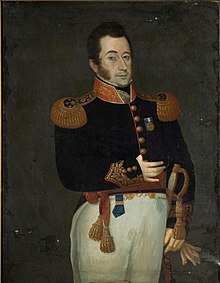Ignacio Álvarez Thomas
José Ignacio Álvarez Thomas (born February 15, 1787 in Arequipa , Peru , † July 19, 1857 in Buenos Aires , Argentina ) was an Argentine officer and politician.
Life
Ignacio Álvarez Thomas was born in Arequipa, Peru, where his father Antonio Álvarez y Ximénez was stationed as the Spanish colonial governor and brigadier general. His mother, Isabel Thomas Ramzé, came from Barcelona .
In 1797 his father was called to Spain. Since Spain was at the side of Napoleon Bonaparte at war with England , the crossing across the Atlantic seemed too dangerous for his family. So Isabel and Ignacio stayed in Buenos Aires.
Ignacio Álvarez joined the Spanish army at a very young age. When the British conquered Buenos Aires under William Carr Beresford in 1806 , the young Álvarez was at the head of a cavalry squad that was supposed to scout out the British naval movements. During the British invasion in 1807 under the command of John Whitelocke , he fought, was badly wounded and was captured by the British.
After the withdrawal of the British, he served with the rank of lieutenant in the volunteer battalion of the Río de la Plata . In May 1810, the council of Buenos Aires overthrew the Spanish viceroy and set up its own government. Ignacio Álvarez Thomas supported the independence movement.
In 1814 he fought in the rank of colonel under the command of Carlos María de Alvear on the side of the Independence Army against the Spanish royalists who were defending their last bastion in Montevideo . When Alvear was at the head of the government of the Provincias Unidas del Río de la Plata , Álvarez Thomas turned against him and supported the coup that overthrew him.
José Rondeau was elected as the new Director Supremo , but he could not take up the office because he was on a campaign in the highlands of Peru. Deputy Álvarez took over the office on April 21, 1815. He sent troops to the rebellious province of Santa Fé; Álvarez was one of the Unitarianists who advocated a strong central state, as opposed to the federalists who wanted extensive provincial autonomy. To clarify this dispute and to draft a constitution, he convened the Congress of Tucumán , which should formally proclaim the independence of Argentina in July 1816. Before that, on May 3, 1816, Álvarez was replaced as Director Supremo by Antonio González Balcarce .
In the conflict that was to become a civil war, he remained an influential representative of the Unitarianists. From 1820 he was sent to Peru and Chile as ambassador for the Province of Buenos Aires .
As a critic of the government of Juan Manuel de Rosas , he was exiled and took up residence in the Brazilian Rio de Janeiro . From there he planned an uprising against Rosas in 1840, but it was unsuccessful. Only after Rosa was overthrown by Justo José de Urquiza in 1852 was he allowed to return to Buenos Aires. He died there in July 1857.
swell
| personal data | |
|---|---|
| SURNAME | Álvarez Thomas, Ignacio |
| ALTERNATIVE NAMES | Álvarez Thomas, José Ignacio (full name) |
| BRIEF DESCRIPTION | Argentine officer and politician |
| DATE OF BIRTH | February 15, 1787 |
| PLACE OF BIRTH | Arequipa , Peru |
| DATE OF DEATH | July 19, 1857 |
| Place of death | Buenos Aires , Argentina |
